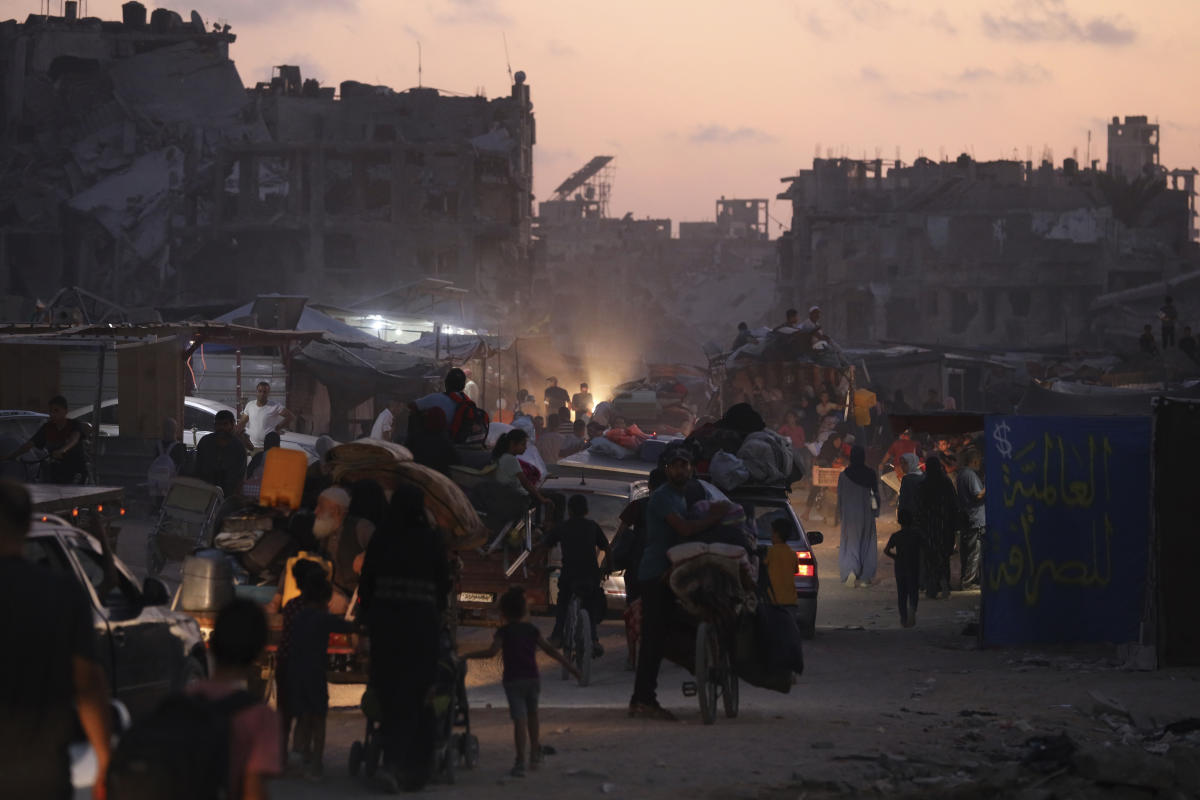DEIR AL-BALAH, Gaza Strip (AP) — The Hamdan family — about a dozen people from three generations — fled their home in the middle of the night after the Israeli army ordered an evacuation from the southern Gaza city of Khan Younis.
They found shelter with extended family members in a building further north, inside an Israeli-declared safe zone. But hours after their arrival, their building in the city of Deir al-Balah was hit by an Israeli airstrike on Tuesday afternoon, killing nine family members and three others.
According to hospital records and a surviving family member, a total of five children and three women are among the dead.
Israel’s order Monday for the population to leave the eastern part of Khan Younis, the territory’s second-largest city, has triggered the third mass flight of Palestinians in as many months, throwing the population into further confusion, chaos and misery as they once again seek safety.
The United Nations estimates that about 250,000 people live in the area under the order, many of whom had recently returned to their homes there after fleeing the Israeli invasion of Khan Younis earlier this year — or had simply sought refuge there after escaping the Israeli offensive on the city of Rafah, further south.
The order also prompted a panicked flight from the European General Hospital, Gaza’s second-largest hospital, located in the evacuation zone. The facility was closed after staff and more than 200 patients were evacuated overnight and on Tuesday, along with thousands of displaced people who had been sheltered on the hospital grounds, according to staff and the International Committee of the Red Cross, which had a medical team there.
Hisham Mhanna, the ICRC spokesman in Gaza, said some families were dragging patients in their hospital beds as far as 10 kilometers (6 miles) through the streets to safety. Ambulances took others elsewhere while staff rushed out valuable equipment, including X-ray, ultrasound and endoscopy machines that are now in short supply, said a nurse, Muhammad Younis.
Hours after the evacuation order was given, the Israeli military said the hospital was not included in the order. But staff said they feared a repeat of previous Israeli raids on other hospitals in Gaza.
“Many hospitals have been reduced to rubble and turned into battlefields or cemeteries,” said Mhanna.
Israel has raided hospitals, claiming Hamas is using them for military purposes. Gaza’s medical authorities deny this claim.
Cars laden with personal belongings poured out of eastern Khan Younis on Tuesday, though the number of refugees was not immediately known. The new exodus adds to the 1 million people who have fled Rafah since May, and tens of thousands displaced in the past week by a new Israeli offensive in the Shijaiyah district of northern Gaza.
“We left everything behind,” said Munir Hamza, a father of three who fled his home in an eastern district of Khan Younis for the second time on Monday night. “We are tired of moving and displacing people. … This is unbearable.”
Nowhere safe
About 15 members of the Hamdan family fled their home in Khan Younis and arrived at their extended family’s home in Deir al-Balah on Monday night, said Asmaa Salim, a relative who lived in the building.
The building was located within the expanded humanitarian zone that the Israeli army declared when it began its offensive on Rafah in May, and Palestinians had to be evacuated there for security reasons.
The strike occurred around 3 p.m. Tuesday. An Associated Press video shows an entire floor of the building burned down. “Almost everyone inside was tortured, only two or three survived,” Salim told AP.
A list of the dead posted at the nearby Al-Aqsa Martyrs Hospital said the dead included the family patriarch, 62-year-old dermatologist Hossam Hamdan, as well as his wife and their adult son and daughter. Four of their grandchildren, aged 3 to 5, and the mother of two of the children were also killed. A man and his 5-year-old son who lived in the building and a man on the street outside were also killed in the strike, which wounded 10 other people, including several children.
The Israeli military did not immediately respond to requests for comment on the attack.
Flight of Khan Younis
Monday’s evacuation order suggested a new ground assault on Khan Younis could be coming, though there was no immediate sign of it. Israeli forces waged a months-long offensive there earlier this year, battling Hamas militants and leaving large parts of the southern city destroyed or badly damaged.
Israel has repeatedly returned to parts of the Gaza Strip it had previously invaded to root out militants who had regrouped there, a sign that Hamas is still able to hold its own, even after nearly nine months of war in Gaza.
The Israeli campaign has killed more than 37,900 Palestinians, most of them women and children, according to Gaza’s Health Ministry, which does not distinguish between fighters in its count. Israel began its campaign after the Oct. 7 Hamas attack, in which militants killed some 1,200 people in southern Israel and took about 250 hostage.
The Israeli military said Tuesday it estimates there are now some 1.8 million Palestinians in the humanitarian zone it has declared, an area of about 14 kilometers (8.6 miles) along Gaza’s Mediterranean coast. Much of that area is now covered in tent camps that lack sanitation and medical facilities and have limited access to aid, the U.N. and humanitarian groups say. Families are living amid mountains of garbage and streams of water contaminated by sewage.
The amount of food and other supplies entering Gaza has plummeted since the Rafah offensive began. The UN says fighting, Israeli military restrictions and general chaos – including looting of trucks by Gaza’s criminal gangs – have made it nearly impossible to collect the trucks full of supplies that Israel has allowed in. As a result, cargo is piling up and uncollected just inside Gaza at the main Kerem Shalom crossing with Israel, near Rafah.
The Norwegian Refugee Council reported last week that it had surveyed nearly 1,100 families who fled Rafah and that 83% of them said they did not have access to food and more than half did not have access to safe water.
On Tuesday, more families fleeing Khan Younis tried to find space in the zone. Um Abdel-Rahman said she and her family of four children — the youngest is 3 — walked for hours at night to reach the zone but found no place to stay.
“There’s no room for anyone,” she said. “We’re waiting and we have nothing to do but wait.”
Noha al-Bana said she has been displaced four times since fleeing Gaza City in the north at the start of the war.
“We are humiliated,” she said. “No proper food, no proper water, no proper bathrooms, no proper place to sleep. … Fear, fear, fear. There is no safety. No safety at home, no safety in the tents.”
___
Magdy and Keath reported from Cairo. Associated Press writer Sarah El Deeb in Beirut contributed to this report.







